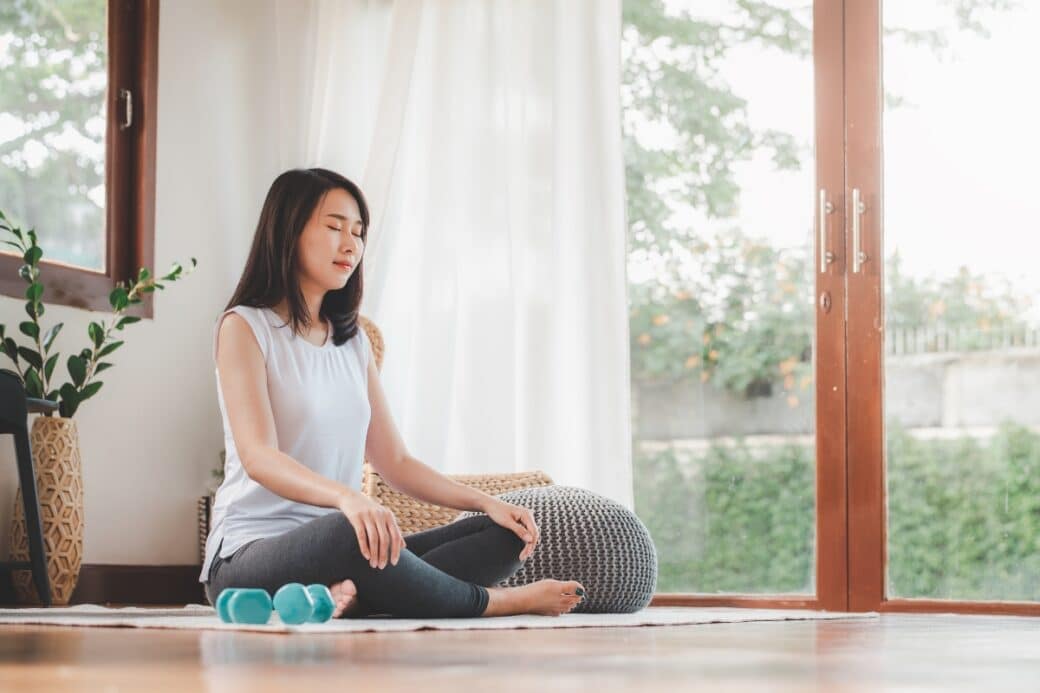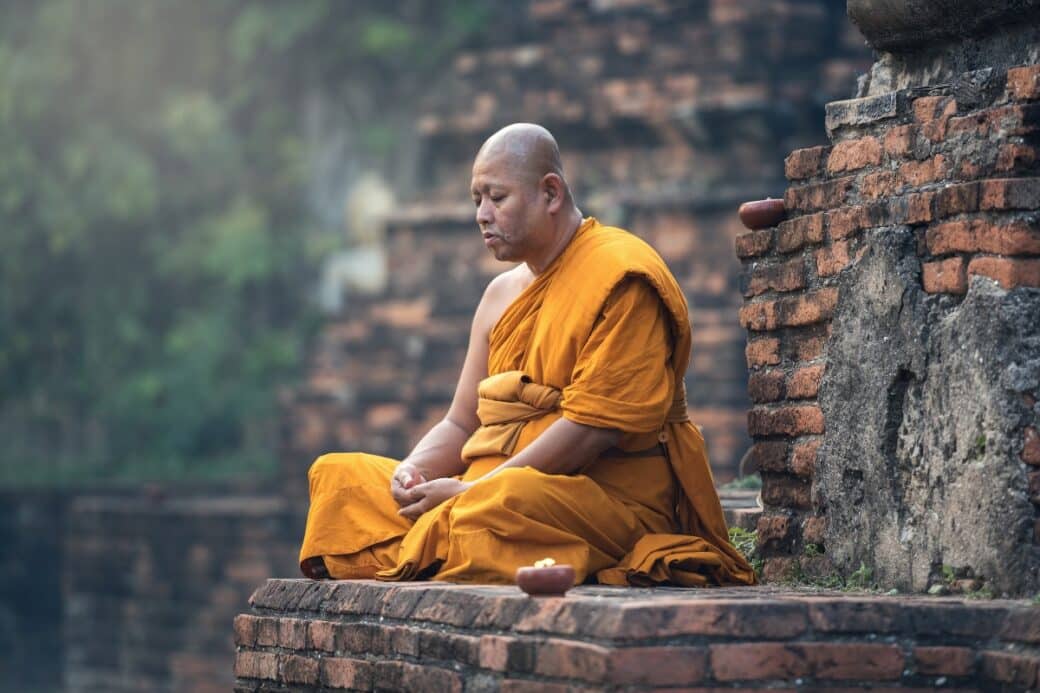Are you feeling lost or disconnected from yourself? Do you crave a deeper understanding of who you really are? Look no further than the transformative practice of meditation. In this article, we embark on a captivating journey of self-discovery through the lens of meditation. By embracing this ancient practice, you will unlock the hidden depths of your being and gain invaluable insights into your true identity. So, get ready to embark on a profound exploration of your authentic self in the realm of meditation.

Understanding the Concept of Meditation
Defining meditation
Meditation is a practice that involves training your attention and awareness to achieve mental clarity and emotional stability. It is often used as a method for relaxation and stress reduction, but its benefits extend far beyond that. Meditation can help you develop a deeper understanding of yourself, enhance your ability to focus, and cultivate a sense of peace and inner tranquility.
The historical context of meditation
The practice of meditation dates back thousands of years, with its origins rooted in ancient Eastern traditions. It has been an integral part of various spiritual and philosophical practices, including Hinduism, Buddhism, and Taoism. Meditation techniques have been passed down through generations, adapting and evolving to suit different cultures and belief systems. Today, meditation has become a global phenomenon, embraced by individuals from all walks of life and practiced in various forms.
Different types of meditation
There are numerous types of meditation, each emphasizing different techniques and goals. Some of the most common forms include:
- Mindfulness meditation: This involves paying attention to the present moment, and acknowledging thoughts and sensations without judgment.
- Transcendental meditation: Utilizing a mantra or a repeated word or phrase, this practice aims to quiet the mind and achieve a state of restful awareness.
- Loving-kindness meditation: Focusing on cultivating feelings of love and compassion towards oneself and others.
- Guided visualization: Using mental imagery to promote relaxation and positive thinking.
- Movement meditation: Incorporating gentle movements, such as yoga or tai chi, to enhance mindfulness and body awareness.
Importance of Self-Discovery
Defining self-discovery
Self-discovery is the process of gaining insight and understanding of your own identity, values, strengths, weaknesses, and passions. It involves delving deep into the complexities of your thoughts, emotions, and experiences to uncover your true essence. Self-discovery goes beyond surface-level knowledge and allows you to develop a profound connection with your authentic self.
Benefits of self-discovery
Embarking on a journey of self-discovery can have transformative effects on your life. By gaining a better understanding of who you are, you can make more informed choices, set meaningful goals, and live a life that aligns with your values and aspirations. Self-discovery also enhances self-acceptance and fosters a sense of inner peace and contentment. It allows you to uncover unresolved issues, heal emotional wounds, and cultivate healthier relationships with yourself and others.
Role of self-discovery in personal growth
Self-discovery is an essential component of personal growth and development. It provides the foundation for building self-confidence, resilience, and self-reliance. Through self-discovery, you can identify patterns of behavior that may be holding you back and work towards personal breakthroughs. It empowers you to step out of your comfort zone, embrace change, and unlock your full potential. Self-discovery is a lifelong process that continually evolves as you navigate different stages of life.

The Connection Between Meditation and Self-Discovery
How Meditation aids in Self-discovery
Meditation serves as a powerful tool for self-discovery by creating a space for introspection and deep reflection. When you engage in meditation, you are encouraged to observe your thoughts and emotions without attaching judgment or over-identifying with them. This practice allows you to develop a greater awareness of your internal landscape and gain insight into your habitual thought patterns, triggers, and deeply ingrained beliefs. By cultivating this level of self-awareness, you can uncover unconscious patterns that may be limiting your growth and make conscious choices that align with your authentic self.
Scientists’ perspective on meditation and self-discovery
Scientists have increasingly researched the link between meditation and self-discovery, shedding light on the neurological and psychological benefits of the practice. Studies have shown that regular meditation can lead to changes in brain structure and function, enhancing attention, emotional regulation, and self-awareness. Researchers have also found that meditation can increase gray matter density in regions of the brain associated with self-relevance and introspection. These findings provide scientific evidence supporting the notion that meditation facilitates self-discovery and personal growth.
Famous figures who ascribe to the link between meditation and self-discovery
Numerous famous figures from various fields have attested to the profound impact of meditation on self-discovery. Renowned spiritual leader and meditation teacher, Thich Nhat Hanh, emphasizes the importance of mindfulness in understanding oneself and finding inner peace. Similarly, influential figures like Steve Jobs, Oprah Winfrey, and Arianna Huffington have publicly spoken about how meditation played a crucial role in their self-discovery journeys. Their stories serve as inspiration, highlighting the transformative power of meditation in uncovering one’s true potential.
Beginning Your Journey to Self-Discovery Through Meditation
Choosing the right type of meditation
With a variety of meditation techniques available, it is important to choose one that resonates with you. Reflect on your goals and intentions for self-discovery and explore different practices. Whether it’s mindfulness meditation, mantra repetition, or movement-based meditation, find a technique that aligns with your preferences and values.
Finding a tranquil place for meditation
Creating a peaceful and distraction-free environment is essential for a fruitful meditation practice. Designate a specific space in your home or seek out natural settings where you can connect with nature. This tranquil setting will help you cultivate a sense of calmness and facilitate deeper introspection during your meditation sessions.
Setting aside regular time for meditation
Consistency is key when it comes to meditation. Set aside a dedicated time each day to engage in your practice. Whether it’s early mornings, during lunch breaks, or before bedtime, find a time that suits your schedule and commit to it. By establishing a regular routine, you will strengthen your meditation habit and make self-discovery a consistent and integral part of your life.
Meditative Techniques for Enhancing Self-Discovery
Breathing techniques
Breath-focused meditation techniques, such as deep belly breathing or alternate nostril breathing, can deepen your connection with your body and calm your mind. By bringing your attention to the rhythm and sensation of your breath, you can ground yourself in the present moment and enhance self-awareness.
Mindfulness techniques
Mindfulness meditation involves observing and accepting your thoughts, emotions, and bodily sensations without judgment. Through consistent practice, you can develop a non-reactive stance towards your internal experiences, allowing you to gain a clearer understanding of your thought patterns and emotional triggers.
Chanting and mantra techniques
Chanting or repeating a specific word or phrase, known as a mantra, can help focus your mind and promote introspection. By choosing a mantra that resonates with your intentions for self-discovery, you can cultivate a sense of inner peace and connect with your authentic self on a deeper level.
The Role of Consistency and Discipline in Meditation
Creating a daily meditation routine
Consistency is crucial for reaping the full benefits of meditation. Set realistic goals for yourself and commit to a daily meditation routine. Start with shorter durations and gradually increase the length of your practice as you develop a stronger habit. As you make meditation a regular part of your life, you will notice its transformative effects on self-discovery.
Dealing with distractions
Distractions are inevitable during meditation, but they need not hinder your progress. When distractions arise, acknowledge them without judgment and gently redirect your attention back to your chosen focal point. Over time, you will cultivate greater focus and resilience, enabling you to navigate distractions more effectively.
Overcoming Common Meditation Challenges
It is common to encounter challenges when starting a meditation practice. Restlessness, wandering thoughts, and impatience are all part of the process. Embrace these challenges as opportunities for growth and practice self-compassion. Remember, self-discovery is a continuous journey, and each meditation session is an opportunity to deepen your understanding of yourself.
Experiences and Realizations While Meditating
Understanding the concept of self while meditating
Meditation provides a unique space to explore the nature of self. As you observe your thoughts, emotions, and sensations, you may begin to question the concept of a fixed and separate self. You may realize that you are more than your thoughts and that the essence of who you are is beyond transient phenomena. This realization can be liberating and open up new dimensions of self-discovery.
Dealing with negative emotions and thoughts
Meditation allows you to develop a compassionate and non-reactive relationship with negative emotions and thoughts. Instead of suppressing or pushing them away, you can observe them without judgment and let them pass through your awareness. By cultivating this gentle detachment, you can gain insight into the underlying causes of negative patterns and work towards healing and transformation.
Harnessing positive experiences and realizations
Throughout your meditation practice, you may experience moments of clarity, deep calmness, or profound insights. These positive experiences can serve as guiding lights in your self-discovery journey. Reflect on these realizations, journal about them, and integrate them into your daily life. By doing so, you can create a positive feedback loop, nurturing continuous growth and self-understanding.
Transformative Effects of Regular Meditation Practice
Positive lifestyle changes
Regular meditation practice has been associated with positive lifestyle changes. As you deepen your self-awareness and understanding, you may find yourself making healthier choices in various aspects of your life. This can include improved sleep patterns, better dietary choices, increased physical activity, and enhanced interpersonal relationships. Meditation catalyzes holistic improvements in your well-being.
Improvements in mental and emotional well-being
Meditation has been shown to reduce anxiety, stress, and symptoms of depression. Through regular practice, you can cultivate emotional resilience and develop healthier coping mechanisms. By honing your ability to observe and accept your thoughts and feelings, you can develop a greater sense of emotional balance, leading to improved mental and emotional well-being.
Increased self-understanding
Perhaps one of the most profound effects of regular meditation practice is an increased understanding of oneself. As you journey through meditation and self-discovery, you will uncover layers of your being, gaining insights into your values, beliefs, and life purpose. This heightened self-understanding allows you to make more conscious choices, live a life aligned with your authentic self, and forge deeper connections with others.
Achieving Mindfulness: The Ultimate Goal of Meditation
Comprehending what mindfulness truly means
Mindfulness is a state of heightened awareness and attention to the present moment. It involves fully engaging with and non-judgmentally accepting your experiences. Mindfulness is not limited to meditation; it can be cultivated throughout your daily life, bringing a sense of clarity, appreciation, and connection to the present moment.
Ways to amplify mindfulness outside meditation
To amplify mindfulness outside of your meditation practice, try incorporating mindful activities into your daily routine. This can range from mindful eating, where you savor each bite and truly appreciate the flavors and textures, to mindful walking, where you pay attention to the sensations in your body and the environment around you. By infusing mindfulness into ordinary activities, you can deepen your connection with the present moment and enrich your self-discovery journey.
How mindfulness can help in self-discovery
Mindfulness and self-discovery go hand in hand. When you cultivate mindfulness, you develop the ability to observe your thoughts, emotions, and sensations without judgment or attachment. This non-reactive stance allows you to gain a clearer understanding of your inner landscape and tap into your deeper wisdom and intuition. Mindfulness enhances self-awareness, facilitating the exploration and unfolding of your authentic self.
Deeper Insights and Wisdom from Long-term Meditators
Words of wisdom from seasoned meditators
Seasoned meditators have valuable insights to offer on the journey of self-discovery. They often stress the importance of consistency, patience, and self-compassion. They emphasize the transformative power of meditation and its ability to help you navigate life’s challenges with greater ease and insight. These experienced practitioners highlight that self-discovery is a lifelong journey, and every moment of meditation is an opportunity for growth and self-realization.
Life changes experienced by long-term meditators
Long-term meditators often report profound life changes as a result of their practice. They speak of increased clarity of purpose, improved relationships, and a deep sense of inner peace. Many mention a greater sense of interconnectedness with the world and a heightened sense of gratitude. These individuals embody the transformative potential of meditation and exemplify the rewards of committing to a lifelong journey of self-discovery.
Staying inspired for a lifelong journey of meditation and self-discovery
Maintaining inspiration and motivation for a lifelong journey of meditation and self-discovery can be challenging. It is important to cultivate a supportive community of like-minded individuals who can provide encouragement and share insights. Engage in ongoing learning by attending retreats, and workshops, or seeking guidance from experienced teachers. Remember to approach your practice with curiosity and an open mind, celebrating each step of your journey and embracing the continuous growth and self-discovery that lie ahead.
In conclusion, meditation is a transformative practice that opens the door to self-discovery. By embracing meditation as a tool for cultivating mindfulness and self-awareness, you can embark on a journey of uncovering your true essence, unearthing your passions, and deepening your connection with yourself and the world around you. Through consistent practice, discipline, and a genuine commitment to self-discovery, meditation can serve as a guiding light on your path toward personal growth, transformation, and inner peace. So, take the first step, find a quiet place, settle into stillness, and allow meditation to reveal the wonders of self-discovery that await you.




